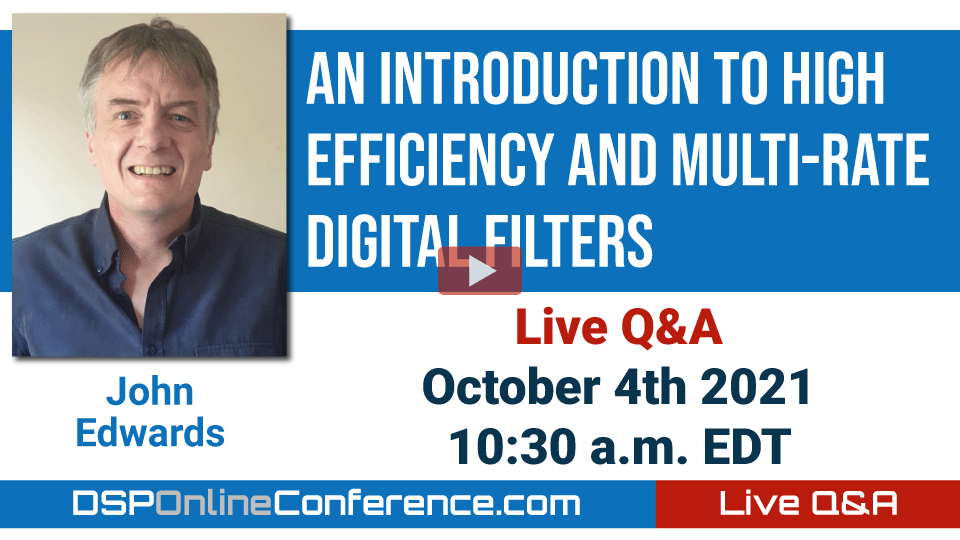Live Q&A with John Edwards - An Introduction To High Efficiency And Multi-rate Digital Filters
John Edwards - Watch Now - Duration: 30:43

Hi FK,
That can depend on the overall specification of the filter you are trying to implement but you are correct, that in general, the group delay is the same because ultimately the group delay for the filter at the higher sample rate will be very long.
Best,
John
fred h here.
can always go back to 1-D filter and deliver 4-inputs tp single stage and of course with first in first out the sample go to addres -3, -2 -1 ,0
yes, indeed, fred
Thanks
John
embedd the resampler between the input integrator and the output comb.... filter becomes a hogenauer filter instead of CIC.. I always recommend to avoid using the cic.... the polyphase will outperfomr the cic in number of registers and width of adders ..
fred
Thank fred and welcome to the conference.
Yes, agreed, I referenced hogenauer in the presentation.
I also referenced your excellent presentation from last year, regarding PP filters.
I'm looking forward to your talks later :-)
J
Hi john,
ignore my question of 7bit Accumulator overflowing, it was very stupid of me.
keeping the 8th, 16th, 24th and 32nd bit zero solves any issue of overflows from lower 7bit group to any upper group.
Thanks RK,
There are no stupid questions in DSP.
I'm glad you understand.
Best regards, John
Hi John! Thank you, it was very nice talk. As far as I understood, polyphase filtering provides both sample rate conversion and lowpass filtering (correct me if I am wrong). CIC filters provides only lowpass filtering (without sample rate conversion). The advantage of CIC is that is computationally efficient but is it the real constraint nowadays? Does CICs are being used in real systems? Cheers!
Hi,
Thank you for your kind words.
Both techniques use filtering and sample rate conversion to achieve the goal.
Yes, computational efficiency is very important to reduce power consumption and cost. Especially in battery applications such as mobile phones.
CIC filters are used in almost all digital radios - laptops (wifi, bluetooth), base stations, phones etc. and are very common. Having said this, PP filters can also be used in these applications and fred harris' 2020 talk, which you can still access this year, gives great insight into how PP filters can be used in place of CIC for wireless applications.
Best,
John
11:52:19 From AllenK : Thanks very much for the talk, John! I am used to the idea of "asynchronous messaging", where you don't know when a message will come in. For "asynchronous clocks" am I correct in assuming that the sample rate is known ahead of time, but that they are not synchronized in a ratio of integers? 12:18:18 From AllenK : Oh, I see now, thanks.




Hi John, very nice presentation thank you.
I would like to ask on the latency of filtering signals in lower rates. Will it have an impact compared to filtering the signal in the original higher rates?
Is my understanding correct that with the technique that you presented, the latency should remain unaffected?